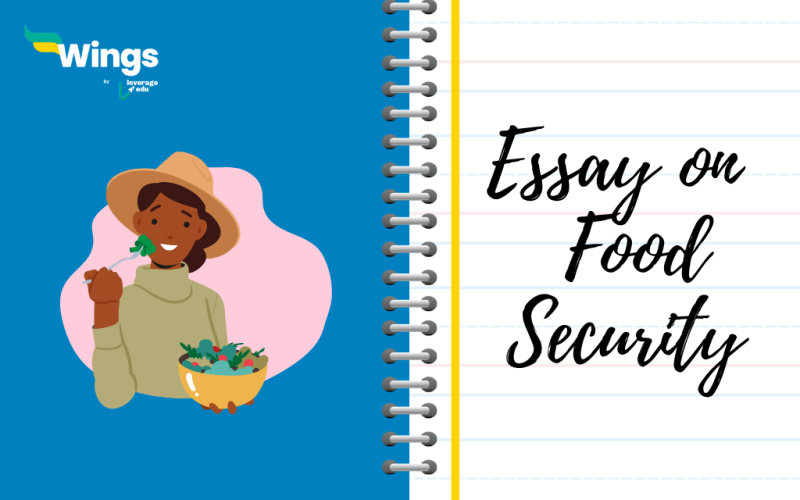Food security means ensuring access to nutritious food for everyone. It is vital for human well-being. In India, diverse challenges persist, but through strategic policies, progress towards ensuring food security is underway. This essay defines food security, looks at the obstacles India faces in securing it, lists the major food security laws that the nation has put in place, and ends with thoughts on the future.
Table of Contents
Essay on Food Security in 500 Words
Food security is a fundamental aspect of human well-being, ensuring that all individuals have access to sufficient, safe, and nutritious food to maintain an active and healthy life. In India, a country with a vast and diverse population, achieving food security is a complex challenge. This essay explores what food security entails, examines the challenges faced in ensuring it in India, outlines key food security policies implemented in the country, and concludes with reflections on the path forward.
Quick Read: Essay on Visit to Zoo in 100, 150, and 250 Words
What is Food Security?
Food security exists when everyone has physical and economic access to sufficient, safe, and nutritious food to meet their dietary needs and food preferences for an active and healthy life. It encompasses four dimensions: availability, access, utilisation, and stability. Availability refers to the consistent presence of food in the market, access refers to the ability of individuals to obtain food, utilization concerns the nutritional value and safety of the food consumed, and stability involves the reliability of access to food over time.
Food Security Challenges in India
India, despite being agriculturally rich, faces significant challenges in ensuring food security for its vast population. Rapid population growth, unequal distribution of resources, climate change, inefficient supply chains, and inadequate infrastructure contribute to the complexity of the issue. Moreover, poverty, unemployment, and social disparities exacerbate the vulnerability of certain segments of society, particularly in rural areas.
Quick Read: Essay Topics for in English
Food Security Policies in India
The Indian government has implemented various policies and programs to address food security challenges. Key initiatives include:
1. Public Distribution System (PDS): The PDS aims to distribute essential food grains, such as rice, wheat, and sugar, at subsidised prices to vulnerable populations through a network of fair-price shops.
2. National Food Security Act (NFSA): Enacted in 2013, the NFSA seeks to provide food and nutritional security by ensuring access to adequate quantities of quality food at affordable prices to all individuals, particularly the poor.
3. Integrated Child Development Services (ICDS): The ICDS aims to improve the nutritional and health status of children under six years of age and pregnant and lactating mothers through supplementary nutrition, health check-ups, and nutrition education.
4. Mid-Day Meal Scheme (MDMS): The MDMS provides cooked meals to schoolchildren to improve their nutritional intake, increase school attendance, and enhance learning outcomes.
5. National Mission on Sustainable Agriculture (NMSA): The NMSA promotes sustainable agriculture practices, soil health management, water conservation, and crop diversification to enhance food security and mitigate climate change impacts.
6. Pradhan Mantri Kisan Samman Nidhi (PM-KISAN): PM-KISAN provides income support to small and marginal farmers by transferring a fixed amount directly into their bank accounts to ensure their financial stability and improve access to food.
7. Rashtriya Krishi Vikas Yojana (RKVY): The RKVY supports states in increasing agricultural productivity and ensuring food security through investments in infrastructure, research and development, and extension services.
Conclusion
Achieving food security in India requires a comprehensive approach addressing the complex interplay of factors affecting food availability, access, utilization, and stability. While significant strides have been made through various policies and programmes, persistent challenges such as poverty, climate change, and inadequate infrastructure continue to undermine food security efforts. Sustained political commitment, increased investment in agriculture and rural development, adoption of sustainable practices, and targeted interventions to address the needs of the most vulnerable populations are essential for ensuring a food-secure future for all Indians.
Essay on Food Security in 200 Words
FAQs
Ans: Assuring every individual at all times of physical and economic access to the food they need.
Ans: Food security is needed because the poor section of society is more insecure as compared to those above the poverty line when the country faces national disasters or calamities like earthquakes, droughts, floods, crop failures, etc.
Ans: Availability, Utilization, and Stability Pillars of Food Security.
Popular Essay Topics in English
| Essay on My Vision for India | Essay on Freedom Fighters |
| Essay on National Unity Day | Essay on Knowledge is Power |
| Essay on Gaganyaan | Essay on Human Rights |
For more information on such interesting topics, visit our essay writing page and follow Leverage Edu.
 One app for all your study abroad needs
One app for all your study abroad needs













